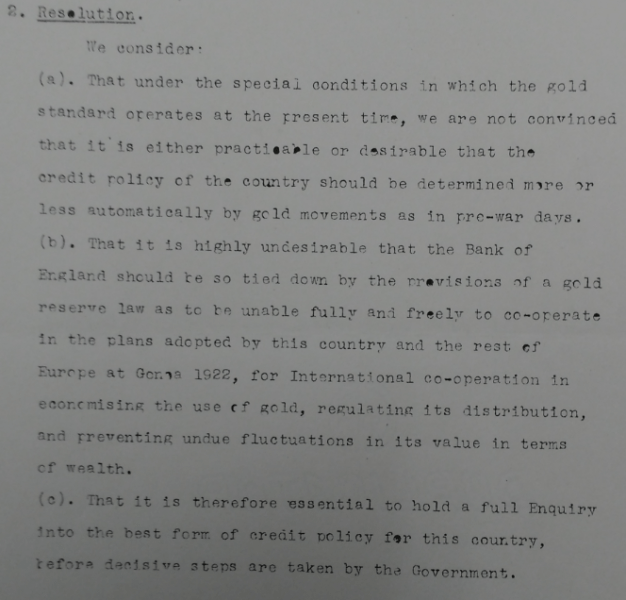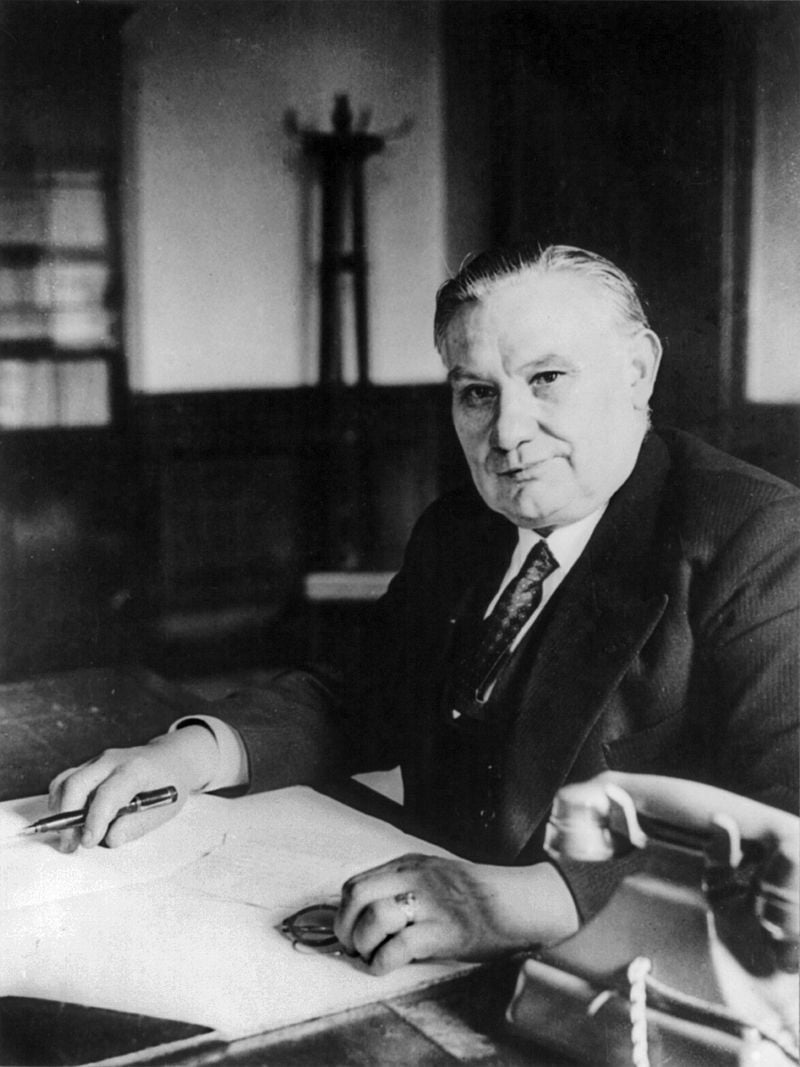(This post is the fuller version of remarks I made at the launch of Econocracy: The Perils of Leaving Economics to the Experts, by Joe Earle, Cahal Moran and Zach Ward-Perkins of ‘Rethinking Economics, London School of Economics, 21ST November 2016. It was first published on the TUC’s Touchstone Blog on 22 November, 2016.)
Parallels have rightly been drawn between the present crisis in economics and the events of the great depression. From considering the important role of trade unions in the crisis of the 1920s and 30s, I suggest three lessons around academia, history and monetary economics.
For me, Ernest Bevin was the greatest figure of the C20 labour movement. Orphaned into poverty, he formed the Transport and General Workers Union, the forerunner of today’s Unite. He made giant contributions to rebuilding the Labour Party, ending his life as foreign secretary in the Attlee Government.
In spite of little or no formal education, he had an uncanny macroeconomic instinct. As the disastrous effects of the gold standard monetary policies and austerity fiscal policies of the 1920s unfolded, Bevin clearly saw the role of orthodox finance and economics.
After the General Strike of 1927 the TUC was instrumental in setting up the so-called ‘industrial peace conference’ (alternatively, the Mond-Turner conference – after Sir Alfred Mond the industrialist who created ICI and Ben Turner who was Chair of the TUC General Council in 1928). A key ask was for businesses to join trade unions in calling for a public enquiry into the gold standard and wider issues around banking, finance and credit. Below is the TUC draft ‘resolution’ that would be signed by both parties:
Source: TUC records at the University of Warwick, file X/3, paper 5/10, dated 28.3.28.
The consequent Macmillan Committee was a model of democratic openness and radical thinking. In particular Keynes was given an official platform. The minutes show he and Bevin exploring each other’s views in some depth, and the two working in tandem to grill witnesses from the financial sector.
Though Bevin was no way in thrall to Keynes. The report of the Committee stopped short of calling for an end to the gold standard, so Bevin published his own reservation. Notably, as a free trader, he also objected to proposals for tariffs.
From then on the trade union movement and Labour Party worked together to devise a radical agenda for monetary reform. Alongside the more progressive Bretton Woods international system, the agenda was critical to the great successes of the Attlee Government. Though there had already been genuine progress over the 1930s in Britain, Roosevelt’s United States and Leon Blum’s France. [1] [Throughout this post suggested further reading is listed at the end, referenced in the text by numbers in square brackets.]
The first of my lessons is the most obvious.
1. Academia Blocks Progress in Economic Thought
In the 1930s the cry that ‘the emperor had no clothes’ came from outside academia. The membership of the Macmillan Committee was drawn largely from the real world (including trade unions, industry and charities as well as banks and academia). No matter his prominence, Keynes was an outsider, and his ideas never accepted by the profession.
As Walter Citrine, TUC General Secretary from 1926 to 1946, later perceptively recalled:
Maynard Keynes had talent, even genius, and possessed a most agile mind. … He would not have called himself a socialist, but he was a progressive of the best type: it took a number of years for his ideas to be accepted, if they ever were, by the orthodox. (my emphasis)
Instead, in 1932, Lionel Robbins of the LSE redefined academic economics around ‘unlimited wants and scarce means’, utterly irrelevant at the peak of the great depression. [2]
So it is unsurprising that in 2016 the challenge to the status quo comes from outside academia. The panel for the book launch lined up Rethinking Economics, the TUC, Joe Richards’ ‘Ecnmy’ initiative, the RSA’s citizens’ panel and the Bank of England.
And likewise it is unsurprising that academia is resisting the call for reform. ’Scarce means’ is translated to the judgement that we have been living beyond our means. So academia has added the promotion of austerity policies to its ever longer list of failures.
2. Economic History is Written by the Orthodoxy
While the profession has operated to keep history off the syllabus, in the classroom students are subject to a distorted view of past events. Trade unions feature primarily as those who wrecked the post war regime, with not a word said about their contribution to building it. Wage claims were obviously part of the inflation of the 1970s, but the reality was far more complex, not least given domestic and international monetary upheaval, the oil shock (related to that monetary upheaval) and the chaotic policies of both the Heath government in the UK and Johnson government in the US.
Virtually everything in the Bevin story conflicts with orthodox history. For example we see Keynes not concerned with fiscal policy to cure crisis, but as a monetary economist concerned to prevent crisis. We see genuine political and economic progress in the 1930s, when the orthodox account concentrates almost solely on the degeneration to protectionism and totalitarianism.
In 1944 the Labour Party issued a policy document that opens:
Blame for unemployment lies much more with finance than with industry. Mass unemployment is never the fault of the workers; often it is not the fault of the employers. [3]
This conclusion is absolutely straightforward and clear cut – as well as compelling. But it has not been debated in the literature. It has simply been omitted from history.
3. The Way Forward is Monetary Economics
Just like the left in the 1930s, the Bank of England has focused its initial (post-crisis) efforts on monetary economics: from the principles of credit creation [4] through to balance sheet outcomes [5], including radical uncertainty [6] and even the potential invalidity of the idea of natural rates [7].
While academia is refusing to contemplate alternative approaches, the Bank is deploying these approaches – specifically, post-Keynesian economics – to aid finding a way forward. In pointing out that orthodox textbooks have money completely wrong, they are really pointing out that orthodox macroeconomics is irrelevant to the problems of the world.
Now, of course, as economic and political conditions have deteriorated, the orthodoxy has been forced to make concessions. Most obviously there is a virtual consensus in favour infrastructure spending. While the orthodox theory views trade unions as unnecessary or, worse, rent seeking (i.e. greedy) [8], and we still have to deal with the Coalition’s cynical and ugly Trade Union act, there is now a growing recognition that trade unions might be on the side of common sense – including calls for workers on boards. But these concessions have only flimsy foundation in the supply-side doctrine of market failure. Bevin appealed to a different doctrine when, as foreign secretary, he was key to the post-war creation of co-determination in Germany. The longer-term outlook around secular stagnation and a falling natural rate of interest offers only indefinite hardship. Fundamentally, orthodox theory cannot resolve a debt deflation when it does not incorporate monetary relations of indebtedness.
Concluding remarks
In seeking to reform economics we should be alive to these three lessons around academia, history and money.
There is a famous quote that “Those who cannot remember the past are condemned to repeat it”. Taking the sum of the three parts: with finance having run amok for at least four decades, can there be any doubt of the relevance of Labour’s diagnosis to today’s world?
In his forward to Econocracy, Andy Haldane, the chief economist of the Bank of England, has called for a Keynes for the twenty first century: my personal view is that a good starting point would be to understand properly the C20 version. (Specifically: we need liquidity preference and the marginal efficiency of capital to counter the dead-end supply-side account of productivity and the rate of interest. [9])
With very malicious political forces exploiting the very real hardship in the world, to not be open to anything and everything seems to me profoundly wrong and extremely dangerous.
Though the same conclusion should be reversed to end on an optimistic note. The so-called golden age after the war was not the result of chance: it was the result of a collective exercise of reason and political will. It is a grotesque parody to suggest it was only made possible by war. We should surely proceed on the basis that a second golden age is within our grasp.
References / further reading (with links)
[1] Geoff Tily (2010) Keynes Betrayed (sorry, can’t be helped!)
[2] Lionel Robbins (1932) An Essay on the Nature and Significance of Economic Science
[3] The National Executive Committee of the Labour Party (1944) ‘Full employment and financial policy’
[4] Michael McLeay, Amar Radia and Ryland Thomas (2014) ‘Money creation in the modern economy’, Bank of England Quarterly Bulletin, 2014Q1
[5] Richard Barwell and Oliver Burrows (2011) ‘Growing Fragilities? Balance Sheets in the Great Moderation’, Financial Stability Paper No 10.
[6] Andy Haldane (2016) ‘The Dappled World’, speech at GLS Shackle Biennial Memorial Lecture, 10 November
[7] Roger Farmer (2013) ‘The Natural Rate Hypothesis: an idea past its sell-by date’, Bank of England Quarterly Bulletin, 2013Q3
[8] Mark Hayes (2016) ‘Trades unions, real wages and full employment’, Post-Keynesian Study Group Working Paper Series, PKWP1615, August 2016
[9] Geoff Tily (2016) ‘As if Keynes had never lived’, Talk on 80th anniversary of publication of Keynes’s General Theory in King’s College Cambridge, October 7 2016, published on Prime Economics.






